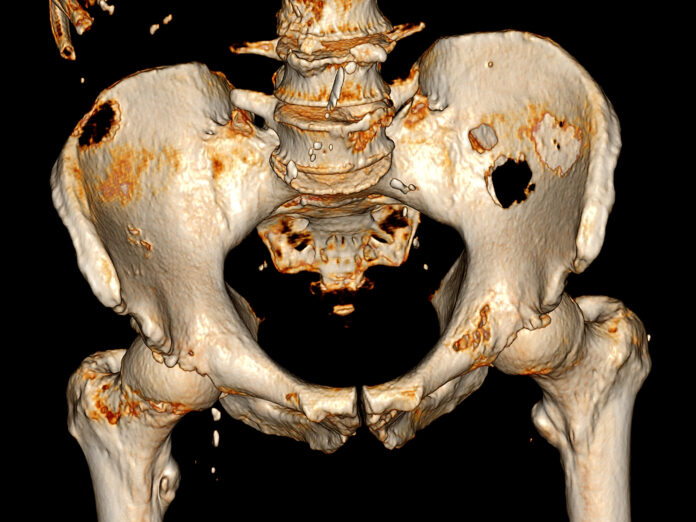
A new type of checkpoint inhibitor targeting bone metastases is being investigated at Rice University and Baylor College of Medicine, thanks to a $2.3M award from the Department of Defense’s Breast Cancer Research Program. Bone metastases are common among patients with solid tumors, such as those of the breast, colon, lung, and prostate. They are also difficult to treat, because they arise in such hard material and have limited vasculature.
“For bone metastasis right now, unfortunately there’s no cure,” said Rice chemist Han Xiao. “It is a terribly painful disease. Patients endure many fractures and surgeries. Better and more effective treatments are badly needed.”
These types of metastases are most common in later stages of cancer, but they can arise at any time during the course of the disease. A recent review of almost 400,000 patient medical records found that mean time to developing bone metastases was about 400 days. Incidence varied substantially by tumor type with prostate cancer patients at highest risk followed by lung, renal, and breast cancer.
But Xiao and Baylor biologist Xiang Zhang may have found a new way train the immune systems to specifically target and kill bone metastases—glyco-immune checkpoints. These comprise immune-modulatory pathways including interactions of glycans with glycan-binding proteins or lectins.
“The glyco-immune checkpoint access we are investigating is associated with various biological processes in the bone metastatic niche,” Xiao told Inside Precision Medicine. “Our preliminary data indicates that inhibitors targeting this axis have the potential to disrupt the ‘vicious cycle’ of osteolytic bone metastasis.”
Their first target is breast cancer. The researchers point out that as many as 40% of breast cancer survivors are diagnosed with metastatic cancer, sometimes years after their initial treatment. Bone metastasis is involved in more than two-thirds of those cases. These lesions can also spread cancer to other organs.
Checkpoint inhibitors target immune-damping proteins on the surface of cancer cells, allowing the immune system to do its job properly. While approved checkpoint inhibitors have given new hope to many patients, so far they have proven ineffective at treating metastatic bone cancer, Xiao said.
“Bone is a really immunosuppressive environment,” Xiao said. “T-cell proliferation is lower, and it is very hard to stimulate the T-cells. That’s why we needed to find a marker, an immune checkpoint marker, that was specific to the bone.”
Unlike other checkpoint inhibitors, which target immune-suppressing proteins, Xiao and Zhang’s therapy targets a specific glycoprotein, a molecule that’s part protein and part sugar. A chemical biologist, Xiao’s research group focuses on both cancer immunology and glycobiology to understand the interface between cancer and immunity.
Xiao and Zhang previously identified the glycoprotein as a glyco-immune checkpoint target that was prevalent in metastatic bone cancer cells. They developed a drug that binds with the glycoprotein, and say that it has been remarkably effective in preliminary tests. In the first lab tests, for example, the treatment eradicated cancer from some animals.
“Our study will, for the first time, reveal how a blockade of the glyco-immune checkpoint in bone may impede bone metastasis and subsequent multiorgan metastases,” said Zhang, interim director of Baylor’s Lester and Sue Smith Breast Center and a member of the Dan L Duncan Comprehensive Cancer Center.
In earlier animal work, Xiao and Zhang used a proprietary technology (pClick, developed by Xiao) to pair the bone drug alendronate (Fosamax) with best-selling, HER2-targeting antibody Herceptin (trastuzumab). They also found that this conjugate could not only eradicate bone metastases, it could also attack secondary new cancers in other organs.
If their approach works in breast cancer, Xiao is hopeful it can be applied in other cancers. “Nearly 70% of prostate cancer patients, for example, will develop bone metastasis,” he points out.
They now plan to do further lab experiments in breast cancer but, “If the results are promising, our intention is to advance these inhibitors to clinical trials.”






![AI Algorithm Could Reduce Breast Cancer Mammogram False Positive Rate The primary goal of the Paradigm Registry is to accelerate tumor profiling based on disease biology. [iStock/LilliDay]](https://www.insideprecisionmedicine.com/wp-content/uploads/2019/01/307-218x150.jpeg)






